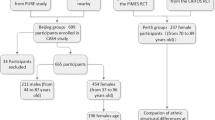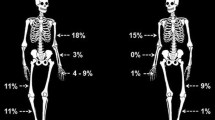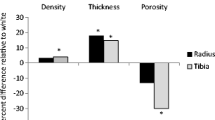Abstract
Summary
Data on bone architecture in diverse male populations are limited. We examined proximal femur geometry in 1,190 black, Hispanic, and white men. Cross-sectional analyses indicate greatest bone strength among black men, and greater age-related differences in bone strength among Hispanic men than other subjects at the narrow neck and intertrochanter regions of the proximal femur.
Introduction
Although race/ethnic differences in bone mass are well-documented, less is known about differences in bone architecture. We examined proximal femur geometry in a diverse, randomly-sampled population of 1,190 community-dwelling men (age 30–79 y).
Methods
Dual X-ray absorptiometry scans were obtained for 355 black, 394 Hispanic, and 441 white subjects. Measures were obtained for the narrow neck (NN), intertrochanter (IT) and shaft regions of the proximal femur via hip structural analysis. Analyses considered bone mineral density (BMD, g/cm2), outer diameter (cm), cross-sectional area (CSA, cm2), section modulus (Z, cm3), and buckling ratio (BR). Results were adjusted for height, weight and physical activity level.
Results
Black subjects exhibited greater age-specific BMD, CSA and Z, than their white counterparts. For instance, at age 50 y, NN BMD was approximately 11% higher among black men (p < 0.001). Hispanic men exhibited sharper age-related differences in NN and IT BMD than did others. IT BMD, for instance, decreased by 2.4% with 10 y age among Hispanic subjects, but had virtually no age trend in others (p < 0.001).
Conclusions
These results imply greater bone strength among black American men than among their white counterparts, and may indicate elevated fracture risk among older Hispanic American subpopulations.



Similar content being viewed by others
References
Seeman E, Delmas PD (2006) Bone quality–the material and structural basis of bone strength and fragility. N Engl J Med 354:2250–2261
Turner CH (2006) Bone strength: current concepts. Ann N Y Acad Sci 1068:429–446
McCalden RW, McGeough JA, Barker MB, Court-Brown CM (1993) Age-related changes in the tensile properties of cortical bone. The relative importance of changes in porosity, mineralization, and microstructure. J Bone Joint Surg Am 75:1193–1205
McCalden RW, McGeough JA, Court-Brown CM (1997) Age-related changes in the compressive strength of cancellous bone. The relative importance of changes in density and trabecular architecture. J Bone Joint Surg Am 79:421–427
Morgan EF, Bayraktar HH, Yeh OC, Majumdar S, Burghardt A, Keaveny TM (2004) Contribution of inter-site variations in architecture to trabecular bone apparent yield strains. J Biomech 37:1413–1420
Araujo AB, Travison TG, Harris SS, Holick MF, Turner A, McKinlay JB (In press) Race/Ethnic differences in bone mineral density in Men. Osteoporos Int
Cauley JA, Fullman RL, Stone KL, Zmuda JM, Bauer DC, Barrett-Connor E, Ensrud K, Lau EM, Orwoll ES (2005) Factors associated with the lumbar spine and proximal femur bone mineral density in older men. Osteoporos Int 16:1525–1537
Barrett-Connor E, Siris ES, Wehren LE, Miller PD, Abbott TA, Berger ML, Santora AC, Sherwood LM (2005) Osteoporosis and fracture risk in women of different ethnic groups. J Bone Miner Res 20:185–194
George A, Tracy JK, Meyer WA, Flores RH, Wilson PD, Hochberg MC (2003) Racial differences in bone mineral density in older men. J Bone Miner Res 18:2238–2244
Looker AC (2002) The skeleton, race, and ethnicity. J Clin Endocrinol Metab 87:3047–3050
Melton LJ 3rd, Marquez MA, Achenbach SJ, Tefferi A, O’Connor MK, O’Fallon WM, Riggs BL (2002) Variations in bone density among persons of African heritage. Osteoporos Int 13:551–559
Looker AC, Wahner HW, Dunn WL, Calvo MS, Harris TB, Heyse SP, Johnston Jr CC, Lindsay R (1998) Updated data on proximal femur bone mineral levels of US adults. Osteoporos Int 8:468–489
Barondess DA, Nelson DA, Schlaen SE (1997) Whole body bone, fat, and lean mass in black and white men. J Bone Miner Res 12:967–971
Cauley JA, Gutai JP, Kuller LH, Scott J, Nevitt MC (1994) Black-white differences in serum sex hormones and bone mineral density. Am J Epidemiol 139:1035–1046
Marshall D, Johnell O, Wedel H (1996) Meta-analysis of how well measures of bone mineral density predict occurrence of osteoporotic fractures. BMJ 312:1254–1259
Kanis JA, Borgstrom F, De Laet C, Johansson H, Johnell O, Jonsson B, Oden A, Zethraeus N, Pfleger B, Khaltaev N (2005) Assessment of fracture risk. Osteoporos Int 16:581–589
Cummings SR, Cawthon PM, Ensrud KE, Cauley JA, Fink HA, Orwoll ES (2006) BMD and risk of hip and nonvertebral fractures in older men: a prospective study and comparison with older women. J Bone Miner Res 21:1550–1556
Siris ES, Brenneman SK, Barrett-Connor E, Miller PD, Sajjan S, Berger ML, Chen YT (2006) The effect of age and bone mineral density on the absolute, excess, and relative risk of fracture in postmenopausal women aged 50–99: results from the National Osteoporosis Risk Assessment (NORA). Osteoporos Int 17:565–574
Brownbill RA, Ilich JZ (2003) Hip geometry and its role in fracture: what do we know so far? Curr Osteoporos Rep 1:25–31
Crabtree NJ, Kroger H, Martin A, Pols HA, Lorenc R, Nijs J, Stepan JJ, Falch JA, Miazgowski T, Grazio S, Raptou P, Adams J, Collings A, Khaw KT, Rushton N, Lunt M, Dixon AK, Reeve J (2002) risk assessment: hip geometry, bone mineral distribution and bone strength in hip fracture cases and controls. The EPOS study. European Prospective Osteoporosis Study. Osteoporos Int 13:48–54
Currey JD (2001) Bone strength: what are we trying to measure? Calcif Tissue Int 68:205–210
Petit MA, Beck TJ, Lin HM, Bentley C, Legro RS, Lloyd T (2004) Femoral bone structural geometry adapts to mechanical loading and is influenced by sex steroids: the Penn State Young Women’s Health Study. Bone 35:750–759
Melton LJ 3rd, Beck TJ, Amin S, Khosla S, Achenbach SJ, Oberg AL, Riggs BL (2005) Contributions of bone density and structure to fracture risk assessment in men and women. Osteoporos Int 16:460–467
Faulkner KG, Cummings SR, Black D, Palermo L, Gluer CC, Genant HK (1993) Simple measurement of femoral geometry predicts hip fracture: the study of osteoporotic fractures. J Bone Miner Res 8:1211–1217
Theobald TM, Cauley JA, Gluer CC, Bunker CH, Ukoli FA, Genant HK (1998) Black-white differences in hip geometry. Study of Osteoporotic Fractures Research Group. Osteoporos Int 8:61–67
Ahlborg HG, Nguyen ND, Nguyen TV, Center JR, Eisman JA (2005) Contribution of hip strength indices to hip fracture risk in elderly men and women. J Bone Miner Res 20:1820–1827
Cheng X, Li J, Lu Y, Keyak J, Lang T (2007) Proximal femoral density and geometry measurements by quantitative computed tomography: association with hip fracture. Bone 40:169–174
Gluer CC, Cummings SR, Pressman A, Li J, Gluer K, Faulkner KG, Grampp S, Genant HK (1994) Prediction of hip fractures from pelvic radiographs: the study of osteoporotic fractures. The Study of Osteoporotic Fractures Research Group. J Bone Miner Res 9:671–677
Szulc P (2006) Bone density, geometry, and fracture in elderly men. Curr Osteoporos Rep 4:57–63
Nelson DA, Barondess DA, Hendrix SL, Beck TJ (2000) Cross-sectional geometry, bone strength, and bone mass in the proximal femur in black and white postmenopausal women. J Bone Miner Res 15:1992–1997
Nelson DA, Pettifor JM, Barondess DA, Cody DD, Uusi-Rasi K, Beck TJ (2004) Comparison of cross-sectional geometry of the proximal femur in white and black women from Detroit and Johannesburg. J Bone Miner Res 19:560–565
Mikhail MB, Vaswani AN, Aloia JF (1996) Racial differences in femoral dimensions and their relation to hip fracture. Osteoporos Int 6:22–24
U.S. Census Bureau, Population Division, Population Projections Branch. http://www.census.gov/population/www/projections/natsum-T3.html, Accessed: 2004 Mar 01.
Bacon WE (1996) Secular trends in hip fracture occurrence and survival: age and sex differences. J Aging Health 8:538–553
Zingmond DS, Melton LJ 3rd, Silverman SL (2004) Increasing hip fracture incidence in California Hispanics, 1983 to 2000. Osteoporos Int 15:603–610
Bauer RL (1988) Ethnic differences in hip fracture: a reduced incidence in Mexican Americans. Am J Epidemiol 127:145–149
Espino DV, Palmer RF, Miles TP, Mouton CP, Wood RC, Bayne NS, Markides KP (2000) Prevalence, incidence, and risk factors associated with hip fractures in community-dwelling older Mexican Americans: results of the Hispanic EPESE study. Establish Population for the Epidemiologic Study for the Elderly. J Am Geriatr Soc 48:1252–1260
Wang MC, Dixon LB (2006) Socioeconomic influences on bone health in postmenopausal women: findings from NHANES III, 1988–1994. Osteoporos Int 17:91–98
Litman HJ, Bhasin S, Link CL, Araujo AB, McKinlay JB (2006) Serum androgen levels in black, Hispanic, and white men. J Clin Endocrinol Metab 91:4326–4334
McKinlay JB, Link CL (In Press) Measuring the Urologic Iceberg: Design and Implementation of the Boston Area Community Health (BACH) Survey. Eur Urol
Washburn RA, McAuley E, Katula J, Mihalko SL, Boileau RA (1999) The physical activity scale for the elderly (PASE): evidence for validity. J Clin Epidemiol 52:643–651
Wallman KK, Evinger S, Schechter S (2000) Measuring our nation’s diversity: developing a common language for data on race/ethnicity. Am J Public Health 90:1704–1708
Beck T (2003) Measuring the structural strength of bones with dual-energy X-ray absorptiometry: principles, technical limitations, and future possibilities. Osteoporos Int 14 Suppl 5:81–88
Martin RB, Burr DB (1984) Non-invasive measurement of long bone cross-sectional moment of inertia by photon absorptiometry. J Biomech 17:195–201
Beck TJ, Looker AC, Ruff CB, Sievanen H, Wahner HW (2000) Structural trends in the aging femoral neck and proximal shaft: analysis of the Third National Health and Nutrition Examination Survey dual-energy X-ray absorptiometry data. J Bone Miner Res 15:2297–2304
Semanick LM, Beck TJ, Cauley JA, Wheeler VW, Patrick AL, Bunker CH, Zmuda JM (2005) Association of body composition and physical activity with proximal femur geometry in middle-aged and elderly Afro-Caribbean men: the Tobago bone health study. Calcif Tissue Int 77:160–166
Demissie S, Dupuis J, Cupples LA, Beck TJ, Kiel DP, Karasik D (2007) Proximal hip geometry is linked to several chromosomal regions: Genome-wide linkage results from the Framingham Osteoporosis Study. Bone 40:743–750
Lauderdale DS, Jacobsen SJ, Furner SE, Levy PS, Brody JA, Goldberg J (1998) Hip fracture incidence among elderly Hispanics. Am J Public Health 88:1245–1247
Burge R, Dawson-Hughes B, Solomon DH, Wong JB, King A, Tosteson A (2007) Incidence and economic burden of osteoporosis-related fractures in the United States, 2005–2025. J Bone Miner Res 22:465–475
Acknowledgement
The BACH/Bone study was supported by grant AG 20727 from the National Institute on Aging (NIA). The parent study (BACH) was supported by grant DK 56842 from the National Institute of Diabetes and Digestive and Kidney Diseases.
Author information
Authors and Affiliations
Corresponding author
Additional information
Grant support: The BACH/Bone study was supported by grant AG 20727 from the National Institute on Aging (NIA). The parent study (BACH) was supported by grant DK 56842 from the National Institute of Diabetes and Digestive and Kidney Diseases.
Rights and permissions
About this article
Cite this article
Travison, T.G., Beck, T.J., Esche, G.R. et al. Age trends in proximal femur geometry in men: variation by race and ethnicity. Osteoporos Int 19, 277–287 (2008). https://doi.org/10.1007/s00198-007-0497-7
Received:
Accepted:
Published:
Issue Date:
DOI: https://doi.org/10.1007/s00198-007-0497-7




